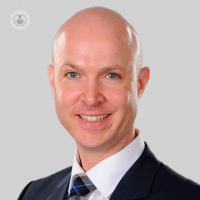Muscle tension dysphonia: what are the symptoms?
Autore:The voice box, or larynx, is a complicated part of the throat with many tiny muscles that work to allow us to breathe and talk. We open our vocal cords when we breathe in and close them when we speak. Expert consultant ENT surgeon Professor Owen Judd explains what happens in cases of muscle tension dysphonia (MTD), where the vocal cord muscles are overly-tight, and what symptoms to be wary of.

How do the vocal cords work?
Voice and speech are different. A voice is simply the vibration sound that our vocal cords make, and speech is the use of this sound to make understandable words and language. When we talk, our voice box closes the vocal cords and the air from our lungs pushes up between them, causing them to vibrate which give us a voice. This vibration of air is then manipulated by the throat muscles, palate, tongue and lips to allow us to produce speech and talk. Essentially, all the vocal cords do is cause vibration of the air.
What is muscle tension dysphonia?
The larynx and vocal cords, however, are very much like a finely-tuned string instrument. When we increase the pitch of our voice the vocal cords or “strings” tighten and when we drop the pitch of our voice to a deep voice, the cords or “strings” slacken off. We can also change the quality of the sound by other subtle changes to the shape and tension of the vocal cords.
These changes in shape and tension are caused by tiny muscles in the larynx that are arranged in pairs, one of each pair on each side of the larynx. If we have an imbalance of the pairs where one muscle is too tight and one is too slack, or if all or some of the pairs are held in too much tension, this causes muscle tension dysphonia.
Dysphonia means disordered sounding voice, and so muscle tension dysphonia or (MTD) means a disordered sounding voice due to over–tight or tense larynx muscles.
What happens to the voice in cases of muscle tension dysphonia?
In order to have a normal-sounding voice, which can easily change pitch with the intonation of speech, and is sustainable as we talk for long periods, the muscles need to be able to change tension and shape as needed. If the muscles cannot freely change shape and tension as required we find that our voice changes the quality and may sound hoarse along with difficulty changing pitch fluently.
When we have MTD due to overly-tight laryngeal muscles, the muscles struggle to move freely and so the voice will sound different.
The voice will sound strained and harsh as the muscles strain and we will struggle to sing and change pitch easily. A common symptom is an inability to reach higher notes when singing, or easily change pitch quickly. The voice can often “break” mid-sentence, or while singing.
Also, if we use muscles at extra tightness or maximal strength continually for too long without a break, the muscles will tire and the voice will fatigue and fade away. If you think what happens if you lift a weight a few times – your arm muscles start to tire and feel weaker and uncomfortable, and you need to rest to let them recover before you can lift the weight again. This same muscle fatigue will happen in the larynx if we talk for too long with over-tight muscles.
We may even start to complain of the muscles aching from overuse in extreme cases, felt like a sore throat or aching in the front of the neck. We may also find that if the muscles tighten suddenly, we can abruptly lose our voice. This may happen if we need to shout or project our voice loudly.
Can you summarise the symptoms of MTD?
Overall, in cases of muscle tension dysphonia, you may experience the following symptoms:
- Change in voice quality with a hoarse or raspy voice.
- Tight-feeling throat or soreness, which worsens toward the end of the day.
- Vocal fatigue and tiring as the day or conversation progresses.
- Strained voice with the inability to easily change pitch and sing, especially higher notes.
- Voice breaks and becomes unreliable.
- Inability to shout or project the voice.
- Pain on talking, and more effort required to speak.
Do not hesitate to book an appointment with Professor Judd if you're concerned about muscle tension dysphonia.


